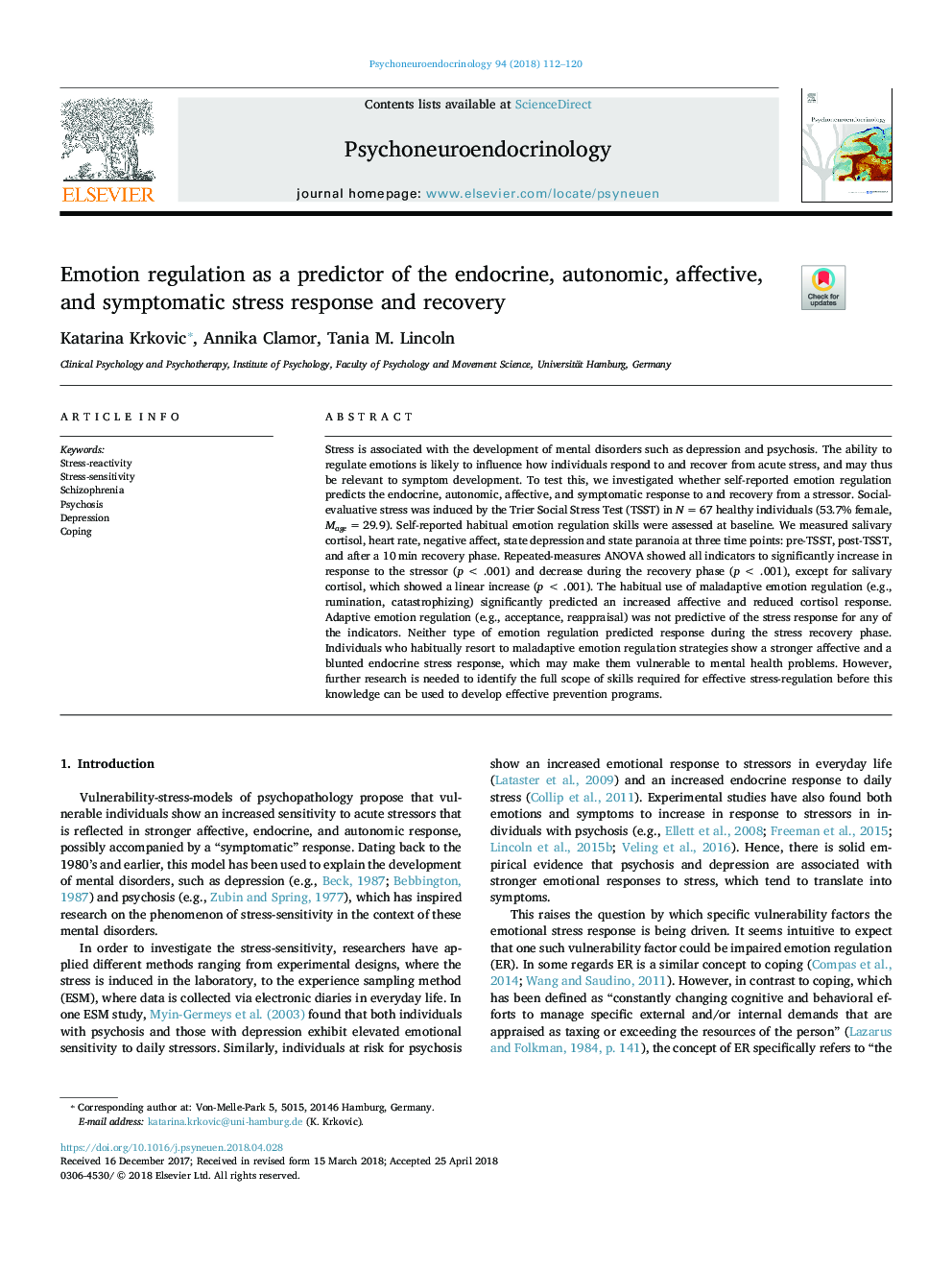| کد مقاله | کد نشریه | سال انتشار | مقاله انگلیسی | نسخه تمام متن |
|---|---|---|---|---|
| 6817569 | 1433949 | 2018 | 9 صفحه PDF | دانلود رایگان |
عنوان انگلیسی مقاله ISI
Emotion regulation as a predictor of the endocrine, autonomic, affective, and symptomatic stress response and recovery
ترجمه فارسی عنوان
مقررات عاطفی به عنوان پیش بینی کننده واکنش استرس، اتونومیک، عاطفی و عاطفی استرس زا و بهبودی
دانلود مقاله + سفارش ترجمه
دانلود مقاله ISI انگلیسی
رایگان برای ایرانیان
کلمات کلیدی
استرس-واکنش پذیری، حساسیت استرس، جنون جوانی، روانپریشی افسردگی، مقابله،
موضوعات مرتبط
علوم زیستی و بیوفناوری
بیوشیمی، ژنتیک و زیست شناسی مولکولی
علوم غدد
چکیده انگلیسی
Stress is associated with the development of mental disorders such as depression and psychosis. The ability to regulate emotions is likely to influence how individuals respond to and recover from acute stress, and may thus be relevant to symptom development. To test this, we investigated whether self-reported emotion regulation predicts the endocrine, autonomic, affective, and symptomatic response to and recovery from a stressor. Social-evaluative stress was induced by the Trier Social Stress Test (TSST) in Nâ¯=â¯67 healthy individuals (53.7% female, Mageâ¯=â¯29.9). Self-reported habitual emotion regulation skills were assessed at baseline. We measured salivary cortisol, heart rate, negative affect, state depression and state paranoia at three time points: pre-TSST, post-TSST, and after a 10â¯min recovery phase. Repeated-measures ANOVA showed all indicators to significantly increase in response to the stressor (pâ¯<â¯.001) and decrease during the recovery phase (pâ¯<â¯.001), except for salivary cortisol, which showed a linear increase (pâ¯<â¯.001). The habitual use of maladaptive emotion regulation (e.g., rumination, catastrophizing) significantly predicted an increased affective and reduced cortisol response. Adaptive emotion regulation (e.g., acceptance, reappraisal) was not predictive of the stress response for any of the indicators. Neither type of emotion regulation predicted response during the stress recovery phase. Individuals who habitually resort to maladaptive emotion regulation strategies show a stronger affective and a blunted endocrine stress response, which may make them vulnerable to mental health problems. However, further research is needed to identify the full scope of skills required for effective stress-regulation before this knowledge can be used to develop effective prevention programs.
ناشر
Database: Elsevier - ScienceDirect (ساینس دایرکت)
Journal: Psychoneuroendocrinology - Volume 94, August 2018, Pages 112-120
Journal: Psychoneuroendocrinology - Volume 94, August 2018, Pages 112-120
نویسندگان
Katarina Krkovic, Annika Clamor, Tania M. Lincoln,
